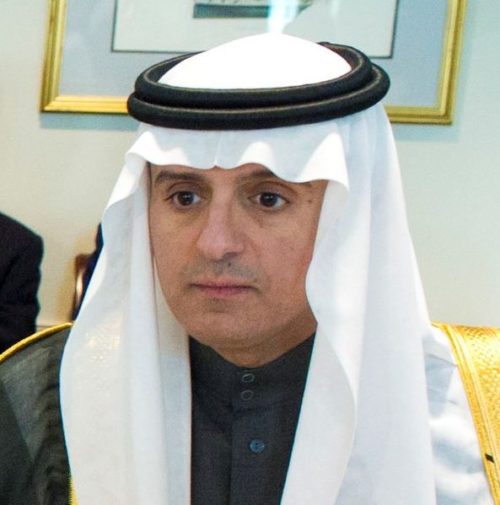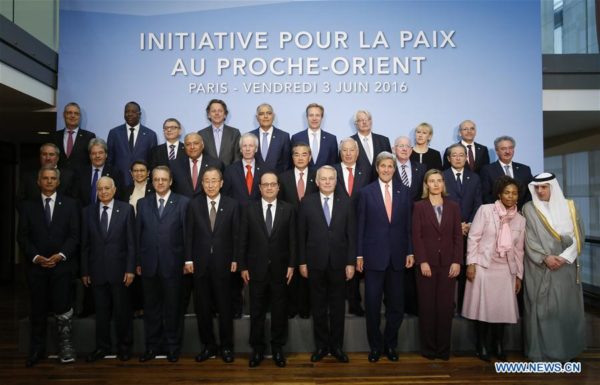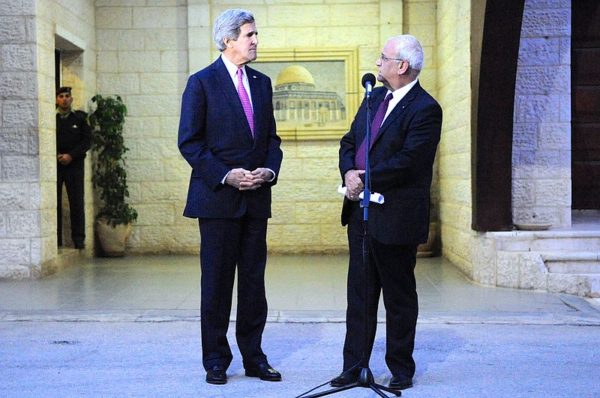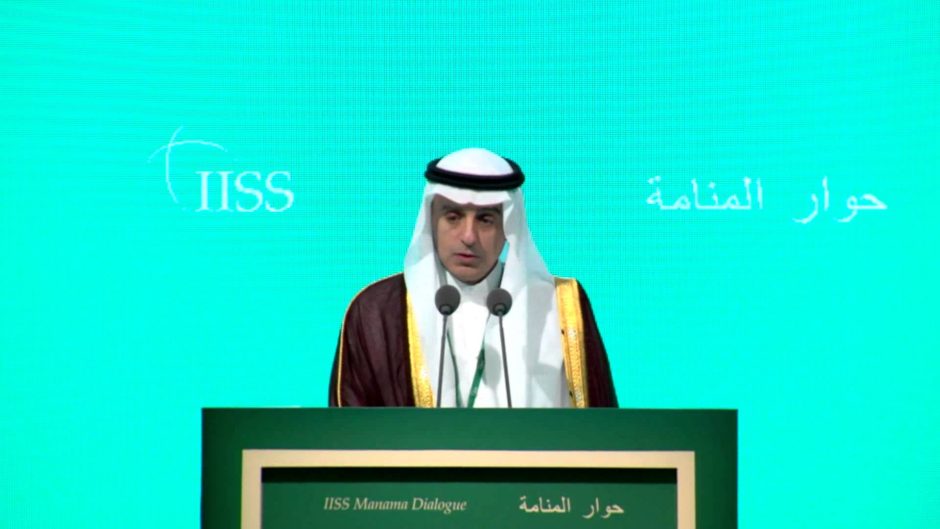Saudi Arabian Foreign Minister Adel al-Jubeir has a point.
The Arab peace initiative, proposed by Saudi Arabia in 2002, endorsed by the Arab League shortly afterwards and revised a few years later, is the best way forward to resolve the protracted Arab-Israeli conflict.

On June 3, in Paris, Jubeir declared that the Arab League peace plan is “still on the table,” saying it has “all the elements needed for a final resolution” of Israel’s perennial dispute with the Palestinians and the Arab world.
Jubeir, the former Saudi ambassador to the United States, made these comments at an international peace conference sponsored by France to restart direct negotiations between Israel and the Palestinian Authority.

The last round of bilateral talks, held under the auspices of U.S. Secretary of State John Kerry, collapsed in a welter of recriminations in the spring of 2014 following nine months of fitful discussions.
PA official Saeb Erekat described the Paris conference, convened by French President Francois Hollande in the presence of diplomats from 29 countries, as a “flicker of hope.”

Israel opposed the conference, with Netanyahu asserting that peace is achievable only through direct negotiations “and not through international diktats.” He claimed the conference had “hardened the Palestinian position” and diminished the chances for peace.
Described by some as little more than a glorified photo opportunity, the three-hour meeting was essentially an exercise in raising consciousness about the need for Arab-Israeli reconciliation. Its communique affirmed the necessity of a two-state solution, decried the status quo, called for an end to Israel’s occupation of the West Bank and the Golan Heights and expressed alarm at “continued acts of violence and ongoing (Israeli) settlement activity.”
If nothing else, the conference underscored the crying need for a substantive and sustainable peace process that will enable Israel and the PA to achieve progress on key issues such as final borders and security arrangements. (It goes without saying that Palestinian rejectionist groups like Hamas and Islamic Jihad, which have yet to recognize Israel or its legitimacy, would not participate in talks).
As pundits have noted, the Arab League initiative is the most promising and comprehensive peace plan ever devised by the Arab states.
It’s an initiative that Israel should embrace in principle and practice with one major reservation, which I will discuss shortly.
The most salient component of the initiative is that the Arab League of nations are ready to normalize relations with Israel if it pulls out of the West Bank, East Jerusalem and the Golan, all of which were captured during the Six Day War.
The initiative envisages the establishment of a Palestinian state in the West Bank and the Gaza Strip, with East Jerusalem as its capital, a mutually acceptable resolution of the Palestinian refugee issue and land swaps between Israel and the PA.
Unfortunately, it was unveiled at the worst possible moment, when Israeli military forces were in the midst of reoccupying major Palestinian towns in Area A of the West Bank in reaction to a spate of devastating suicide bombings carried out by terrorists inside Israel during the second intifada.
To no one’s surprise, Israel supported the clause in the plan that requires pan-Arab recognition of its existence. Israel, however, balked at relinquishing territory it had acquired in 1967 and voiced fears it would be swamped by an influx of Palestinian refugees.
As a result, Israel danced around the Arab proposal, never formally replying to it.

About a week before Jubeir announced that the Arab League plan is still on the table, Israeli Prime Minister Benjamin Netanyahu and his new defence minister, Avigdor Liberman, said they were interested in resuming negotiations with the PA.
“My government remains committed to pursuing peace with the Palestinians and with all our neighbors,” said Netanyahu.
Liberman, a resident of a West Bank settlement, sounded an upbeat note too, pledging his commitment to “peace and to a final-status agreement” with the Palestinians.
It remains unclear why Netanyahu suddenly demonstrated an appreciation for the plan.
Nabil Elaraby, the secretary of the Arab League, ascribed his new-found interest in a desire to torpedo France’s diplomatic campaign and to expand trade with the Arab Gulf states. “He doesn’t really want the Arab initiative,” said Elaraby.
Another theory is that Netanyahu was trying to calm concerns about his controversial decision to reappoint Liberman to the cabinet and to assure Egyptian President Abdel Fattah al-Sisi that he agrees with his assessment that there is a “real opportunity” for a peaceful resolution of the conflict.

Former British prime minister Tony Blair seems to think so. On May 25, he claimed that Sunni Muslim nations are prepared to normalize relations with Israel if it negotiates an accord with the PA based on the Arab League plan.
“A lot will depend on the response of the Israeli government to President Sisi’s initiative and to the Arab peace initiative,” said Blair, who has served as the Middle East envoy of the Quartet, composed of the United States, Russia, the European Union and the United Nations.
Five days later, Netanyahu offered a partial endorsement of the Arab League plan, saying it “contains positive elements that could help revive constructive negotiations” with the Palestinians. “We are willing to negotiate with the Arab states revisions to that initiative so that it reflects the dramatic changes in our region since 2002, but maintain the agreed goal of two states for two peoples.”
As far as the Saudis are concerned, revisions are out of the question. As Jubeir said, “The Arab peace initiative does not need changing or adjusting. It is on the table as is.”
In fact, given the dramatic events that have unfolded in the Middle East in the past 14 years, it will have to be updated to reflect current realities. The civil war in Syria is one of these realities.
Under present conditions, Israel is less than willing to cede the Golan to the Syrian regime. But if President Bashar Assad’s forces prevail and Syria somehow returns to stability and normality, the Israeli government will have to reconsider its policy, provided Syria is willing to sign a peace treaty with Israel.
The Arab League is on firmer ground in demanding an Israeli withdrawal from the West Bank. But Netanyahu, in keeping with his rigid Zionist Revisionist convictions, has shown no willingness to give up the West Bank, vacate East Jerusalem, or dismantle settlements.
Even if Netanyahu adopts a flexible/sensible policy toward the Palestinians, he will face problems from within his cabinet.

Naftali Bennett, the education minister and leader of the far-right Jewish Home Party, has threatened to bolt the coalition and thus scuttle his government if Netanyahu tries to implement a two-state solution.
“If we are talking about a return to the 1967 lines and the division of Jerusalem, I won’t just resign from the government, I’ll topple it,” warned Bennett, who supports Palestinian autonomy.
As Bennett correctly pointed out, the notion of Palestinian statehood is glaringly absent from the government’s policy guidelines.
Without Bennett’s eight Knesset seats, Netanyahu would either have to find a new partner, possibly opposition leader Isaac Herzog, or call fresh elections.
Given his real views on Palestinian statehood and his instinct for political self-preservation, Netanyahu is extremely unlikely to grant the Palestinians independence and sovereignty. As observers have pointed out, Netanyahu’s chief objective is to reach an agreement with Sunni Arab states, leaving the Palestinian question for last.
The Arab League, however, wants to reverse the order of this incremental process.
Since the two sides are loath to compromise over this pivotal issue, the Arab-Israeli conflict will continue to fester, dragging Israel and the Palestinians into yet more strife and bloodshed.
